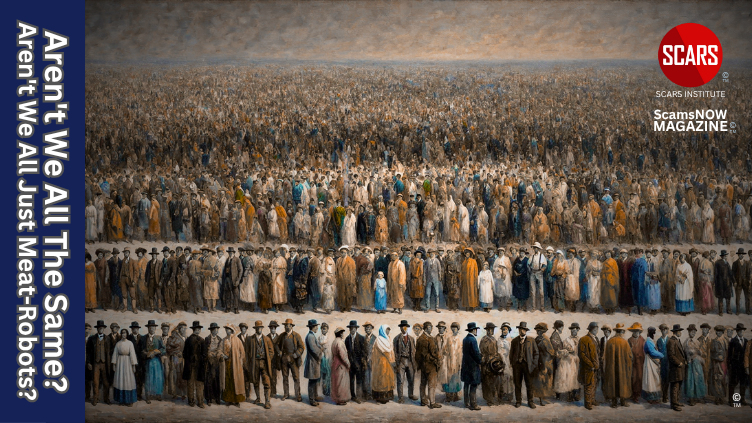
Aren’t We All The Same? Aren’t We All Just Meat-Robots?
Primary Category: An Essay on Humanity & Philosophy
Author:
• Tim McGuinness, Ph.D., DFin, MCPO, MAnth – Anthropologist, Scientist, Polymath, Director of the Society of Citizens Against Relationship Scams Inc.

Aren’t We All The Same?
Aren’t We All Just Meat-Robots?
An essay on Humanity by Tim McGuinness, Ph.D., DFin, MCPO, MAnth – Anthropologist, Scientist, Polymath, Director of the Society of Citizens Against Relationship Scams Inc.
That is an important existential question, and it touches the core of both philosophy and neuroscience.
In one sense, yes; all humans share the same basic architecture. You have the same kind of brain, nervous system, and biological design as everyone else. We all start life with a nervous system that seeks survival, comfort, connection, and meaning. Your brain comes preloaded with the same fundamental operating system as every other person’s. You process sensory information, experience emotions, learn through memory, and build narratives to make sense of life. This shared human structure forms the foundation of empathy and understanding because, at a biological level, you are made from the same materials as every other human being.
However, what makes each person different is the specific data that fills this shared system. Your personal experiences, your emotional responses, your traumas, your joys, and the memories you collect shape the chemicals your body releases. These chemicals reinforce patterns in your nervous system. Over time, you develop your own habits of thought, emotional reactions, and defense mechanisms. You begin telling yourself stories to explain who you are, what life means, and how you should behave. These stories are not just entertainment. They become the blueprint for your decisions, relationships, and worldview.
So in practical terms, you could say that all humans are the same machine at the factory level, but life programs each machine differently. The wiring is universal, but the inputs are personal.
This leads to both freedom and responsibility. You cannot change the fact that you are a human animal with human needs, fears, and limitations. However, you do have some control over the stories you tell yourself and the meanings you assign to your experiences. You can reflect on the patterns you have developed, question the narratives that no longer serve you, and learn to manage your emotional and cognitive responses. This is how growth happens. It is not about changing your biological foundation. It is about learning to operate the system better.
In existential terms, you are both unique and the same. You share the human condition, but you experience it through your own lens. The challenge is to recognize your shared humanity without losing sight of your personal responsibility to shape the life you live.
Even though all humans share the same basic structure, the same brain design, nervous system wiring, and emotional architecture, society cannot survive on similarity alone. That is why communities create laws, rules, and social expectations. These are not just arbitrary systems of control. They exist to shape behavior, create external order, and maintain compatibility between individuals. Without these agreed-upon boundaries, life would descend into chaos. People would follow only their impulses, desires, or fears. Conflicts would escalate, trust would collapse, and cooperation would vanish.
Rules create the framework that allows millions of unique individuals, each with their own chemistry, memories, and personal narratives, to live together without destroying each other. They set the limits that protect the collective from the dangers of unchecked personal freedom. You might not always like the rules, but without them, the social world would collapse into violence and isolation. Laws are not just restrictions—they are tools that help humans survive together.
Even though most of us begin life the same, many people break along the way. Life throws trauma, betrayal, and hardship into the mix. We learn things that harm us. We pick up destructive ideas from the people we trust. We associate with those who encourage dysfunction, and sometimes we embrace ideologies that fracture our ability to live in peace with others. Over time, this breaks people; not just emotionally, but psychologically. Some become so damaged that repair feels impossible. They fall so far into hatred, violence, or delusion that they cannot or will not return to any shared sense of humanity. These are the individuals who cause harm on a scale that feels irredeemable. Society struggles with the question of what to do with them. If humans were just preprogrammed machines, we could reinitialize ourselves, wipe the drive, and start over. But we are not machines. We are complicated, emotionally driven beings. Once we reach a certain point of damage, there may be no reset option.
This creates a moral and social dilemma. What do we do with the people who cannot be repaired? How do we balance compassion with accountability, safety with hope? Some people commit acts or adopt belief systems so destructive that reintegration becomes impossible. Yet we cannot ignore the fact that all of us share the same original design. We are born with the same nervous system, the same capacity for empathy, and the same potential for growth. The difference is what life does to us, and what we do with the results.
Each person has a responsibility to exist in some general state of harmony with their community. You are not just here to survive. You are here to function in a way that aligns with your original programming. That means recognizing when you are glitched. It means admitting when trauma has distorted your view of the world. It means catching yourself when hate, rage, or fear begin to overtake your reasoning.
You have an obligation to find a path back toward healing, even when your neurology makes that difficult. This is not just personal work. It is communal work. It is the prime directive of human life: to let go of unnecessary suffering, to rebuild what trauma has broken, and to renew your humanity in a way that allows you to live among others without destruction.
At the core of human existence lies a simple but profound reality: we all start from the same basic structure. We share the same brain architecture, the same nervous system blueprint, and the same fundamental needs. Yet life does not treat everyone equally, and people do not respond to experience in the same way. Some break under the weight of trauma, others fall into hatred or destruction, and some wander so far from their original programming that they become dangerous to themselves or others. This is not just a philosophical observation; it is a real-world challenge that affects every society, every community, and every individual life.
The solution is not simple, but the starting point is clear. Each person carries the responsibility to monitor their own system. You must recognize when your thoughts, emotions, or behaviors are veering off course. You have the obligation to work through trauma rather than spread it. You need to confront your own glitches; those moments when suffering turns into aggression, when fear becomes cruelty, or when isolation turns into destructive ideology. This is difficult, especially when pain feels overwhelming or when neurological patterns seem locked in place. But it is not optional if you want to live in harmony with others.
Society needs laws and systems to manage those who cannot or will not repair themselves. That is reality. We create structures to prevent chaos, protect the vulnerable, and maintain order. However, those systems are only half the solution. The other half comes from personal accountability. It comes from each person choosing to participate in life without becoming a source of unnecessary harm. You are not just a passive product of your experiences. You are an active participant in what happens next.
The conclusion is this: being human means more than surviving trauma or navigating social systems. It means waking up every day and choosing to return to your own humanity. It means asking hard questions about your behavior, your thinking, and your role in the world. It means refusing to let brokenness become your permanent identity. Renewal is not always easy, but it is always necessary. This is the task of life: to repair where you can, to protect where you must, and to live in a way that leaves space for both caution and compassion.
Dr. Tim, 2025
-/ 30 /-
What do you think about this?
Please share your thoughts in a comment below!
One Comment
Leave A Comment
TABLE OF CONTENTS
CATEGORIES
![NavyLogo@4x-81[1] Aren't We All The Same? Aren't We All Just Meat-Robots? An essay on Humanity by Tim McGuinness, Ph.D. - 2025](https://scamsnow.com/wp-content/uploads/2025/04/NavyLogo@4x-811.png)
ARTICLE META
Important Information for New Scam Victims
- Please visit www.ScamVictimsSupport.org – a SCARS Website for New Scam Victims & Sextortion Victims.
- SCARS Institute now offers its free, safe, and private Scam Survivor’s Support Community at www.SCARScommunity.org – this is not on a social media platform, it is our own safe & secure platform created by the SCARS Institute especially for scam victims & survivors.
- SCARS Institute now offers a free recovery learning program at www.SCARSeducation.org.
- Please visit www.ScamPsychology.org – to more fully understand the psychological concepts involved in scams and scam victim recovery.
If you are looking for local trauma counselors, please visit counseling.AgainstScams.org
If you need to speak with someone now, you can dial 988 or find phone numbers for crisis hotlines all around the world here: www.opencounseling.com/suicide-hotlines
Statement About Victim Blaming
Some of our articles discuss various aspects of victims. This is both about better understanding victims (the science of victimology) and their behaviors and psychology. This helps us to educate victims/survivors about why these crimes happened and not to blame themselves, better develop recovery programs, and help victims avoid scams in the future. At times, this may sound like blaming the victim, but it does not blame scam victims; we are simply explaining the hows and whys of the experience victims have.
These articles, about the Psychology of Scams or Victim Psychology – meaning that all humans have psychological or cognitive characteristics in common that can either be exploited or work against us – help us all to understand the unique challenges victims face before, during, and after scams, fraud, or cybercrimes. These sometimes talk about some of the vulnerabilities the scammers exploit. Victims rarely have control of them or are even aware of them, until something like a scam happens, and then they can learn how their mind works and how to overcome these mechanisms.
Articles like these help victims and others understand these processes and how to help prevent them from being exploited again or to help them recover more easily by understanding their post-scam behaviors. Learn more about the Psychology of Scams at www.ScamPsychology.org
SCARS INSTITUTE RESOURCES:
If You Have Been Victimized By A Scam Or Cybercrime
♦ If you are a victim of scams, go to www.ScamVictimsSupport.org for real knowledge and help
♦ SCARS Institute now offers its free, safe, and private Scam Survivor’s Support Community at www.SCARScommunity.org/register – this is not on a social media platform, it is our own safe & secure platform created by the SCARS Institute especially for scam victims & survivors.
♦ Enroll in SCARS Scam Survivor’s School now at www.SCARSeducation.org
♦ To report criminals, visit https://reporting.AgainstScams.org – we will NEVER give your data to money recovery companies like some do!
♦ Follow us and find our podcasts, webinars, and helpful videos on YouTube: https://www.youtube.com/@RomancescamsNowcom
♦ Learn about the Psychology of Scams at www.ScamPsychology.org
♦ Dig deeper into the reality of scams, fraud, and cybercrime at www.ScamsNOW.com and www.RomanceScamsNOW.com
♦ Scam Survivor’s Stories: www.ScamSurvivorStories.org
♦ For Scam Victim Advocates visit www.ScamVictimsAdvocates.org
♦ See more scammer photos on www.ScammerPhotos.com
You can also find the SCARS Institute’s knowledge and information on Facebook, Instagram, X, LinkedIn, and TruthSocial
Psychology Disclaimer:
All articles about psychology and the human brain on this website are for information & education only
The information provided in this and other SCARS articles are intended for educational and self-help purposes only and should not be construed as a substitute for professional therapy or counseling.
Note about Mindfulness: Mindfulness practices have the potential to create psychological distress for some individuals. Please consult a mental health professional or experienced meditation instructor for guidance should you encounter difficulties.
While any self-help techniques outlined herein may be beneficial for scam victims seeking to recover from their experience and move towards recovery, it is important to consult with a qualified mental health professional before initiating any course of action. Each individual’s experience and needs are unique, and what works for one person may not be suitable for another.
Additionally, any approach may not be appropriate for individuals with certain pre-existing mental health conditions or trauma histories. It is advisable to seek guidance from a licensed therapist or counselor who can provide personalized support, guidance, and treatment tailored to your specific needs.
If you are experiencing significant distress or emotional difficulties related to a scam or other traumatic event, please consult your doctor or mental health provider for appropriate care and support.
Also read our SCARS Institute Statement about Professional Care for Scam Victims – click here
If you are in crisis, feeling desperate, or in despair, please call 988 or your local crisis hotline – international numbers here.
More ScamsNOW.com Articles
A Question of Trust
At the SCARS Institute, we invite you to do your own research on the topics we speak about and publish. Our team investigates the subject being discussed, especially when it comes to understanding the scam victims-survivors’ experience. You can do Google searches, but in many cases, you will have to wade through scientific papers and studies. However, remember that biases and perspectives matter and influence the outcome. Regardless, we encourage you to explore these topics as thoroughly as you can for your own awareness.

























![scars-institute[1] Aren't We All The Same? Aren't We All Just Meat-Robots? An essay on Humanity by Tim McGuinness, Ph.D. - 2025](https://scamsnow.com/wp-content/uploads/2025/04/scars-institute1.png)

![niprc1.png1_-150×1501-1[1] Aren't We All The Same? Aren't We All Just Meat-Robots? An essay on Humanity by Tim McGuinness, Ph.D. - 2025](https://scamsnow.com/wp-content/uploads/2025/04/niprc1.png1_-150x1501-11.webp)
excelente!!! la claridad y la profundidad del análisis son realmente impresionantes. Me aportó mucho leerlo. totalmente de acuerdo entre la similitud de la estructura sel ser humano y a la vez tan unicos y particulares en nuestro interior, en nuestro yo que se va desarrollando de acuerdo a nuestra herencia, entrno y viviencias…